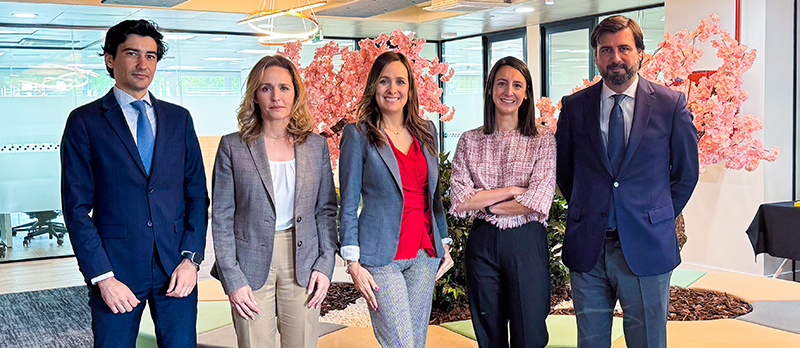
In late March, the CNMV updated its Q&A document on the performance-based management fee model and included new warnings for target return funds. These new fee models of funds were discussed by participants at the XXX FundsPeople legal debate, who appreciate the ultimate aim of protecting investors, although they believe that setting these limits is unnecessary. New fee models of funds
In particular, Collective Investment Institutions must set a performance benchmark period of at least five years, instead of the current three years. This is something that María Tomillo, partner in charge of the Financial Services Regulation Department at Simmons & Simmons, sees as positive: 'We have sometimes seen investors making investment decisions based on periods that are too short. By requiring a lengthier track record, investors will be presented with a greater amount of information concerning the fund's performance, leading them to make a more informed decision', she suggested. This new obligation is applied in two tranches depending on the timing of the payment by the Collective Investment Institution.
Moreover, for Collective Investment Institutions with a specific target return, additional caveats need to be included whenever their financial structure implies that a substantial part of the returns of the fixed-income portfolio will be absorbed by the costs passed on to the fund. The CNMV calculates these thresholds to be 0.60% per annum of assets, or 25% of the expected gross annual returns on the fixed-income portfolio.
Further obligations
The sector is fearful of how these requirements may impact entities, one of the many affecting Collective Investment Institution Fund Managers. 'We are concerned with the pressure that regulators are putting on entities. Such a high regulatory burden means that they have to devote significant resources (in terms of staff, systems development, etc.) to comply with their obligations, which inevitably ends up having an impact on the cost borne by customers', warned Maite Álvarez, an expert lawyer in financial regulation at finReg360.
A view also shared by Tomillo: 'There is an excessive focus on investor protection. Although there are certain areas where further protection could be afforded, I believe consumers are sufficiently protected and at times too much pressure is being placed on entities as to how these products are launched and marketed. Entities thus continue to face significant implementation costs, which are ultimately reflected in the bottom line', she warned.
For Elisa Ricón, CEO of Inverco, proof that governance in the pricing practices of entities is working is provided by the fact that 'competition in the market is fierce and the costs borne by shareholders are falling. All this in a context where the costs borne by fund managers are increasing due to the need to implement sustainability, new investments, operational resilience, etc.', she added. Alfredo Oñoro, Director of Regulatory Compliance at Cecabank, expressed a similar stance: 'The Spanish supervisor defends high thresholds of protection for retailers, which also implies issuing recommendations in terms of price, both of which are laudable and respectable; however, they must also act with great caution so as not to undermine the competitiveness of the Spanish market. It is important not to over-regulate in certain areas because this could lead to a loss of competitiveness', he suggested.
Other points to bear in mind
In line with the role of the CNMV and the latest technical guide, Tomillo explained that the text 'includes the same level of warnings for foreign funds that are marketed in Spain, meaning that international entities with target return funds registered in Spain for their marketing, are opting to include the corresponding warnings in their own prospectuses to guarantee the information that is passed on to the end investor, although this obligation falls directly on the marketing entities'. However, the CNMV cannot enforce foreign fund managers to include such warnings in their prospectuses, and therefore, with regard to foreign funds, the CNMV expects the local distributors themselves to provide this warning to end customers, thus shifting the responsibility for this matter to them. 'This could mean that a local distributor might prefer to market a national product that does include such warnings in its prospectus, as opposed to a foreign one that does not, because they do not want to assume the responsibility of having to provide customers with such a warning', noted Álvarez.
Venture capital
Another issue concerning Collective Investment Institutions raised by the experts pertains to venture capital. According to Miguel Sánchez Monjo, partner at Cuatrecasas, 'in practice, situations arise in which the fund manager or persons associated with it acquire assets in their own name and then transfer them to the venture capital vehicle. Such transactions are considered by the CNMV to pose a conflict of interest and should be executed very exceptionally. In Sánchez Monjo's opinion, 'the CNMV wants the funds' supervisory committees to validate these transactions and for them to be executed under market conditions, as well as for investors to be made aware in advance of the possibility of these transactions being executed', he added.
A warning is also included with regard to retail investor protection when the latter wants to invest in a venture capital firm and seek to be treated as a professional customer. In order to assess whether it qualifies as a professional investor, the CNMV requires the investor to have made significant investments with a certain frequency in the relevant market in which the fund is to invest, in addition to complying with the remaining conditions to be eligible to be treated as a professional customer. Sánchez Monjo warned: 'The CNMV does not allow retail investors to be prompted by fund managers to request to be treated as professional investors through the provision of a questionnaire in which the customer classifies itself as a professional investor (for example, through the provision of an addendum to that effect in the subscription agreement)'.


